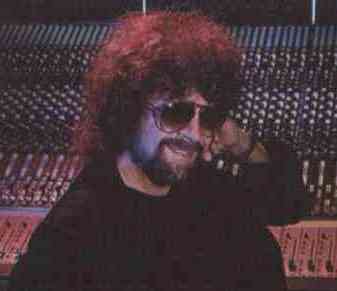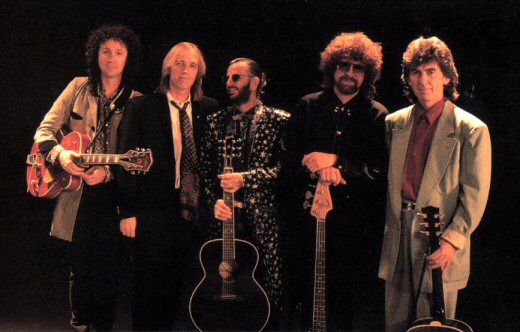

Jeffrey "Jeff" Lynne was born on 30th December 1947 in Birmingham, UK. He formed an interest in music while still at school, influenced by artists such as Del Shannon, whose concert at the Birmingham Town Hall made a lasting impression on young Jeff and was to change his whole future, Roy Orbison and, of course The Beatles. When he was fifteen, Jeff was given a plastic guitar by his father. Though it had only one string and cost about two pounds, he practised every spare minute. Jeff spent much of his time in the front room of his parents' council house in Shard End, Birmingham, which he had taken over with his guitars, amplifiers, tape recorders and piles of records. After he had left school, he took on a number of jobs none of which lasted more than a few weeks. Playing guitar in one or two local groups like The Chantelles and The Andycaps, Jeff was always looking for the chance to turn professional. In 1966, at the age of nineteen, he joined a local Birmingham band called The Nightriders, who were looking for a guitar player through an advert. He amazed his fellow band members with his stunning guitar technique and proved to be a good singer and harmonizer, too. The band subsequently changed their name to The Idle Race and made young Jeff their front man. Soon he wrote most of the band's songs and became the producer of their second LP as well .The Idle Race released two albums, The Birthday Party (1968) and Idle Race (1969) plus a couple of singles, but never really enjoyed the success they were aiming at.
In 1970 Jeff Lynne left the band in order to join The Move, then a very popular and successful band in Britain, accepting Roy Wood's second invitation, who promised his old friend Lynne to launch a new project, called The Electric Light Orchestra, which had been on his mind for a couple of years. Their idea was to form a ten-piece ensemble with cellos, violins, french horn etc. and play symphonic rock. "... I suppose that the Electric Light Orchestra is meant to take up where 'I Am The Warus' left off, and to present it on stage."(Lynne) It took them almost two years to fulfill their ambitious plan to transform The Move into The Electric Light Orchestra since its first public announcement in May 1970 - they did not release ELO's eponymous debut album until December 1971. In the meantime they still recorded and performed as The Move, which was a necessary move in order to finance their new project: Two more albums, Looking On (1970) and Message From The Country (1971) and a couple of relatively successful singles were released, before The Move ceased to exist.
Within a week of ELO's first single release, "10538 Overture", in June 1972, Roy had left the band to form Wizzard: "I left ELO partly because attention was being focused on me, and not the band as a whole, and partly to save the friendship between Jeff and myself. ... It got to a point where Jeff didn't speak to me much - and I couldn't stand that." Roy's departure left Jeff the sole band leader, and he took over the composer's duties, too.
The first of many ELO U.S. tours began in California in June 1973, and the band were well received. Audience enthusiasm ensured that ELO returned to the States for increasingly longer tours, each one bigger and more spectacular than the last, culminating in heir legandary 1977 "Out Of The Blue" tour. However, despite ELO's highly successful tours in the seventies, Lynne became increasingly more uneasy about touring: "I like making records better than playing live. I like to play tight - I used to love playing in clubs and stuff. When it got to those big arenas, with 20.000 people and all the equipment, it became less fun for me. I like to get it right - or try to. When you're playing on tour, you can't do that. It sounds different every night. There's too many people involved. You can't really get it spot-on. And the size of the place totally destroys the sound."
While the first three albums Electric Light Orchestra (1971) [US: No Answer], Electric Light Orchestra II (1972) and On The Third Day (1973) were somewhat experimental and seemed to lack direction, their fourth album, Eldorado (1974), the band's first collaboration with arranger/conductor Louis Clark, was a ground breaking success and defined the new direction of the group's overall sound: "Eldorado was the turning point. I always wanted a bigger sound, so I used a 40-piece orchestra and wrote the songs for that." Making the record, framed with an overture and a finale and subtitled "A Symphony By The Electric Light Orchestra", was a big thrill: "Hearing all these guys strike up with that big tune was amazing." Lynne raved: "This is the way I've always wanted the group to sound - what I was aiming for in the first place. It's the first time it's actually sounded like an Electric Light Orchestra." Face The Music (1975) gave Jeff Lynne his first worldwide smash with the single "Evil Woman".
With A New World Record (1976) ELO's commercial ascendance gained momentum: The album spent almost a year on the American charts, falling out of the Top 40 only two months before the release of Out Of The Blue (1977), the record that would bring ELO to its commercial apex. Originally to be called Out Of This World, the title was felt to resemble its predecessor's too closely, so Lynne got another chance to exercise his fixation with the colour of his hometown soccer team - witness "Boy Blue", "Mr. Blue Sky", "Bluebird", "Bluebird Is Dead" and "Midnight Blue"! The double album was recorded in Munich in just three months after Lynne had locked himself into a Swiss chalet to plan his masterpiece: "I'd usually have all the songs written before we went in the studio. I'd take the songs along to the practice hall where we'd learn them", explains Lynne, "I would never sing until all the instruments were finished. We'd learn all the backing tracks, go in the studio and lay them down in a few days. Then we'd put all the rest of the stuff on, like the orchestra. Then I'd play the guitars or whatever else, do the backing vocals and then maybe the choir." Musical geniuses like Lynne often have peculiar ways of writing songs: "I had a tune in my head, but I never told anybody what it was. It was always a mystery to everybody. I'd have ten tracks full of orchestra, choir, group, everything - a great big sound and no words. I saved the words until the very last minute. [...] I came up with the words either the day before or I'd spend a week just doing words and go in and sing the lot."
In 1979 Lynne gave the world Discovery, and it became ELO's most successful worldwide release, reaching No. 1 and shipping platinum. Later that same year, Lynne was offered the opportunity to score a soundtrack for a film, Xanadu, that looked like a surefire smash, starring the late 70's female icon, Olivia Newton-John. Though the film added precious little to the history of cinema and became a mega-flop with both critics and audiences, the soundtrack Xanadu (1980) was extremely successful in commercial terms, bringing ELO another platinum album (actually, half of one: Olivia Newton-John occupied one side by herself) and three hit singles, including the title track, for which Olivia did the vocals and which became ELO's first and only No. 1 hit in the UK. Despite this commercial success, Jeff took the movie's failure very badly and came to loathe his involvement with the film, since it finally destroyed any pitiful remainig shreds of credibility that the band still might have possessed in the eyes of the public.
Although the Electric Light Orchestra had always been Lynne's prime concern, he also made a few attempts at working on solo material and producing other artists. His first project were two songs he contributed to the soundtrack All This And World War Two (1976), the Beatles cover songs "Nowhere Man" and "With A Little Help From My Friends", followed by his pop single "Doin' That Crazy Thing" (b/w "Going Down To Rio") in 1977 which didn't do very well. In 1984 he contributed two songs to another soundtrack, Electric Dreams: "Video" which was also released as a single (b/w "Sooner Or Later") and "Let It Run". Among the first artists Jeff produced while he was still with ELO were Del Shannon (1974/75), Jasper Carrot "Funky Moped" (1975) and Dave Edmunds, whose albums Information (1983) and Riff Raff (1984) contain some material by Lynne. Furthermore Jeff Lynne also wrote a couple of songs for other artists, such as Helen Reddy's "Poor Little Fool" (1978), The Everly Brothers' "The Story Of Me" (1984) and Agnetha Fältskog's "One Way Love" (1985).
The eighties saw the release of three more ELO albums, Time (1981), Secret Messages (1983) and Balance Of Power (1986), none of which achieved the same success as ELO's heyday albums of the late seventies. Looking back on that period in 1990, Lynne spoke candidly of those records: "They lack inspiration, because I didn't have any. I really had enough by Time; I was getting to not like it by then. I thought I'd be in the mood for the next one and, at the time, I thought I was. But now I listen to it and I wasn't. I was in a cocoon, with a lack of direction and nobody to bounce off. I started thinking how nice it would be to work with other people. I did the last album and then I was free of it."
In 1986, after a charity gig in Birmingham, a final gig in Wembley Stadium and two more shows in Germany, Jeff Lynne finally lost interest and split the band he had helped to found, moving onto a solo career involving writing, recording and producing some of rock's biggest names: George Harrison (Cloud Nine, 1987), Roy Orbison (Mystery Girl, 1989 and King Of Hearts, 1992), Tom Petty (Full Moon Fever, 1989 and Into The Great Wide Open, 1991) and Del Shannon (Rock On!, 1991). Other production credits include Randy Newman, Duane Eddy, Brian Wilson, Ringo Starr, Joe Cocker, Dave Morgan, Hank Marvin, Miss B. Haven, Julianna Raye and Tom Jones.

Lynne was instrumental in forming the all star supergroup Traveling Wilburys together with Harrison, Petty, Dylan and Orbison in 1988. They released two albums, the very succesful and critically acclaimed Vol. 1 (1988) and its poor selling successor Vol. 3 (1990). When his record company, Warner Bros. offered him the chance to release a solo album, he came up with Armchair Theater (1990). This much underrated album never really hit it off and its first single "Every little thing" was only a minor hit for Lynne.
In 1994/95 he fulfilled a lifetime's ambition and stepped into George Martin's shoes,
producing his idols, The Beatles. He worked on two songs for their Anthology
project, the reunion single "Free As A Bird" and "Real Love", another Lennon demo. Subsequently,
Paul McCartney asked Lynne to help him on his next solo album,
Flaming Pie, (1997) which contains eight tracks
co-produced by Jeff. In May 1996 Jeff Lynne received another Ivor Novello award for Outstanding
Services To British Music.
 Jeff & The Beatles *
Jeff & The Beatles *  Jeff Lynne Pictures
Jeff Lynne Pictures
last modified: 07.08.2005